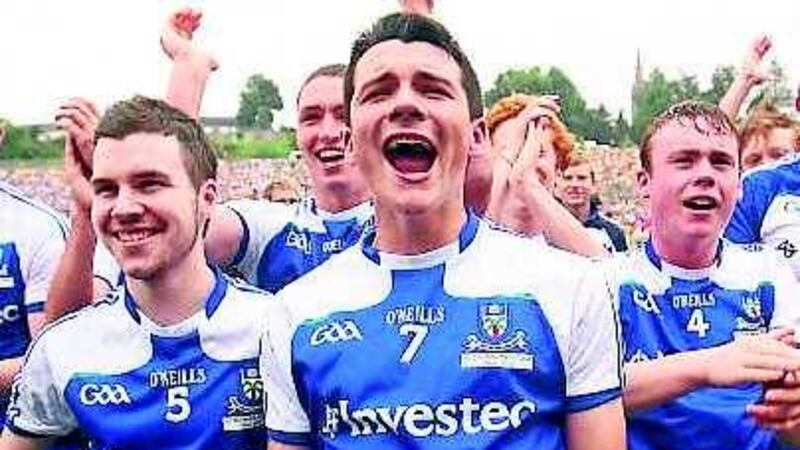WHILST it's good to have an open mind towards change in all walks of life, it is equally prudent to tease out the ultimate impact of the recommended change of direction and determine whether or not the net outcome validates the movement away from that which has served us well.
In the final analysis, it is a question of discerning between change for change sake, and if indeed the proposed change is better than the situation or process it replaces.
Sadly, particularly in recent years, we in the GAA appear to have been over-dosed in the former and it shows little sign of abating. It is all the more difficult to understand, therefore, when our Association has never been as popular in terms of sporting and cultural attraction as it is right now.
Despite the steep economic decline at world, European and domestic levels, the numbers playing and supporters attending our games and events continue to rise.
A recently-published report from the FRC championed their perceived need for change on a number of fronts. In addition to the proposal to numerically align the provinces, there was a recommendation from this appointed committee to change the long-standing minor inter-county competition from U18 to U17.
As I alluded to in last week's column, the substance for the former is questionable as the key premise on which it is being 'sold' is to streamline the inter-county championship programme of games across the country.
It seems just a little contradictory to this overall aim if to do so involves introducing a minimum of four extra games.
Equally puzzling is to have four of the perceived weaker teams - three from Leinster and one from Ulster - play in an adoptive province.
This formula couldn't realistically be deemed to greatly enhance the competitive nature of those new entities or challenge the more powerful teams in those respective provinces.
If this particular change was chiefly motivated by the need to address the current uncertainty around a predetermined programme of club fixtures, one wonders could the programme of inter-county games not have been condensed within the parameters of the status quo.
If counties are not of a mind to leave their natural province of their own volition - and I can't think of any who are - does this whole process not fail in its objective of clearing more space for club programmes?
Playing four extra games doesn't exactly fulfil this criterion. Why then entertain such a proposal - change for change sake? Or perhaps this is a third category of incremental camouflaged change on the way to an unacceptable destination.
The attempt to restructure the minor grade from U18 to U17 is another example of dubious change. For many years now there have been various attempts to interfere with this particular level of inter-county football.
The previous consideration focused around raising the age of that specific grade to U19 and simultaneously removing the U21 grade from the fixture calendar.
Thankfully that initiative was unsuccessful.
A combination of factors, including interfering with exam study and burnout, were regularly mooted as the basis for this desired departure. Whilst there may have been some substance in the latter by way of the acute and multiple demands placed on players at U21 level, the educational argument in relation to the minor age group was - and is - much less convincing.
The notion that the amount of time which our elite young players spend in relation to their sporting prowess mitigates against their ability to succeed academically is grossly exaggerated.
On the contrary, their ability to manage the time between study, sporting excellence and good social engagement will actually prove advantageous for those wishing to pursue a third level qualification. So too will that ability to balance all aspects of their life impress prospective employers.
There is simply not significant evidence to support the view that athletes who can perform at this level lose out academically. Indeed, there are numerous examples of young men who excelled in both departments. Traditionally, all Ulster Championship games presented the supporters with a double-bill. Most people enjoy watching the minor game and speculating over potential stars of the future. Some of the players in their final year at this grade can realistically look forward to joining the senior ranks within a year or two. If the age drops to 17, then the level of interest in the so-called 'curtain raiser' is likely to be diminished.
A possible consequence might well be that smaller attendances will turn up for the greater part of the 'minor' game. Not only would this be doing a disservice to the paying public, but it would give much less profile to the young emerging talents.
Having worked with Tyrone minors for eight years in the 1990s, in an era when they attracted much less media coverage than is currently the case, playing before the seniors and experiencing the accompanying atmosphere was a particular highlight for these future stars.
The truth, of course, was that for the majority of these young players this would be their only chance to have such an experience as the rule dictates that the majority never get this opportunity again in their careers. When the directive was introduced in the early 1990s that teams from the 26 counties would not play Championship football at minor grade during the month of June, many young men from our provinces were robbed of that unique opportunity to be part of an Ulster Championship day.
It seemed a little bizarre that, although the reason this departure was introduced was because of students doing the Leaving Cert, teams from the six counties continued to play during that month despite having to sit their A-levels.
Individuals on teams from counties within the latter educational system have never professed to have been disadvantaged, career-wise, due to their involvement in games at this level in the years since the introduction of that particular rule.
Indeed, a number of such teams have gone on to win the All-Ireland at this grade. All the more surprising, therefore, to see this excuse forwarded as the raison d'etre for an U17 competition as opposed to the traditional minor grade.


